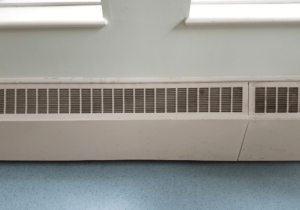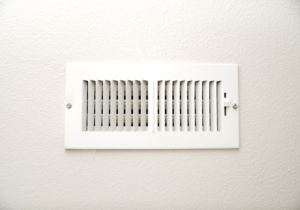December 8, 2022
Baseboard Heating vs. Forced Air
When it comes to heating your home, there are a few different options to choose from. One of the most common choices is between baseboard heating and forced air heating. Both have their own advantages and disadvantages, so it can be tough to decide which one is right for you. In this post, we will discuss the pros and cons of both types of heating systems, so that you can make an informed decision about what is best for your home!
Baseboard Heating
 Baseboard heating is a type of convection-based heating system that uses hot water or electricity to heat radiators along the baseboard of a wall. The heated air then rises and circulates warm air throughout the room, creating an even temperature. This type of heating is often more efficient than forced air systems since it works at lower temperatures – meaning you’ll use less energy overall. On top of this, baseboard heating tends to be much quieter since no fans or motors are running.
Baseboard heating is a type of convection-based heating system that uses hot water or electricity to heat radiators along the baseboard of a wall. The heated air then rises and circulates warm air throughout the room, creating an even temperature. This type of heating is often more efficient than forced air systems since it works at lower temperatures – meaning you’ll use less energy overall. On top of this, baseboard heating tends to be much quieter since no fans or motors are running.
However, although baseboard heating may be more efficient, it does have some drawbacks as well. For one thing, installation can be quite expensive because it requires ripping up walls and floors to install the radiators. Additionally, since the radiators can get quite hot, there is a risk of burns or other injuries if children or pets come in contact with them.
Forced Air Heating Systems
Forced air heating systems use a blower fan to distribute warm air throughout your home via ducts. This type of system is usually more affordable than baseboard heating to install and can be used in conjunction with an existing central cooling system as well. Additionally, forced air systems tend to heat up a room faster than baseboard heaters because they rely on higher temperatures and greater circulation.
 On the downside, forced air systems run louder than baseboard heaters due to their motors and fans. They can also be less efficient when it comes to energy usage since they need to operate at higher temperatures and they can also be susceptible to dust, dirt, and other allergens.
On the downside, forced air systems run louder than baseboard heaters due to their motors and fans. They can also be less efficient when it comes to energy usage since they need to operate at higher temperatures and they can also be susceptible to dust, dirt, and other allergens.
Ultimately, the choice between baseboard heating vs forced air comes down to your own needs and preferences. Both systems have their advantages and drawbacks and so it is important to weigh up all of the factors before making a decision. Consider your budget, energy usage goals, safety concerns, noise level preferences and any other considerations before you purchase either type of system for your home.
Regardless of which system you choose, it’s always important to regularly maintain it in order to keep it running smoothly and efficiently throughout the year. Regular maintenance will help ensure that your system is running at peak performance, so be sure to check in with a heating and cooling professional regularly for tune-ups.
